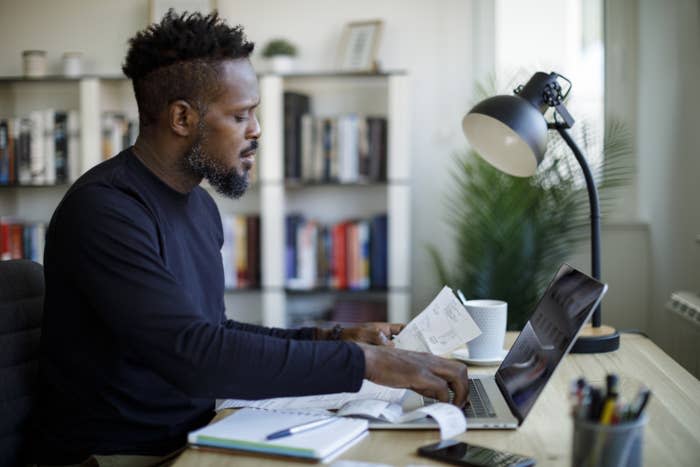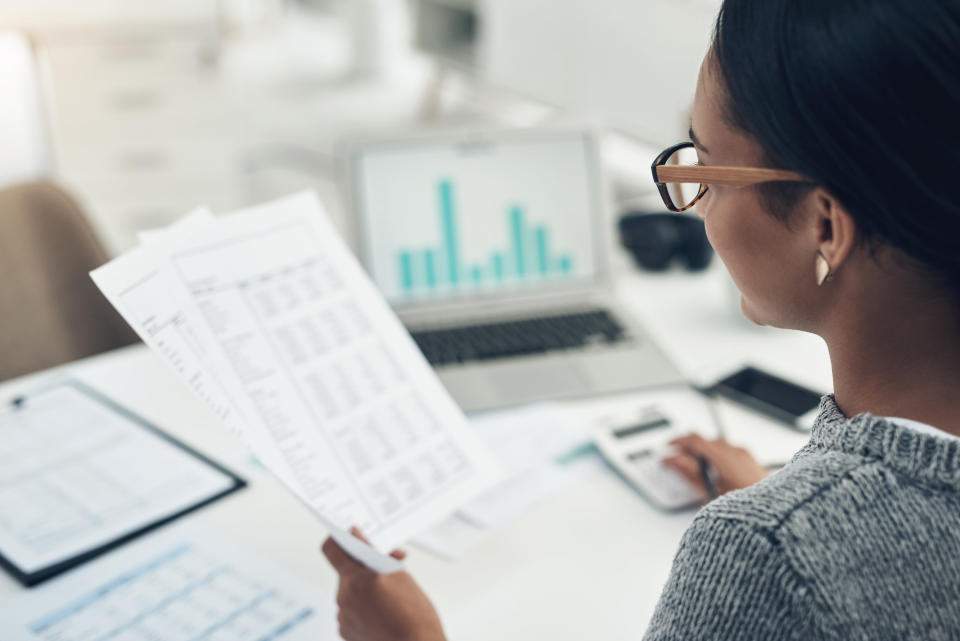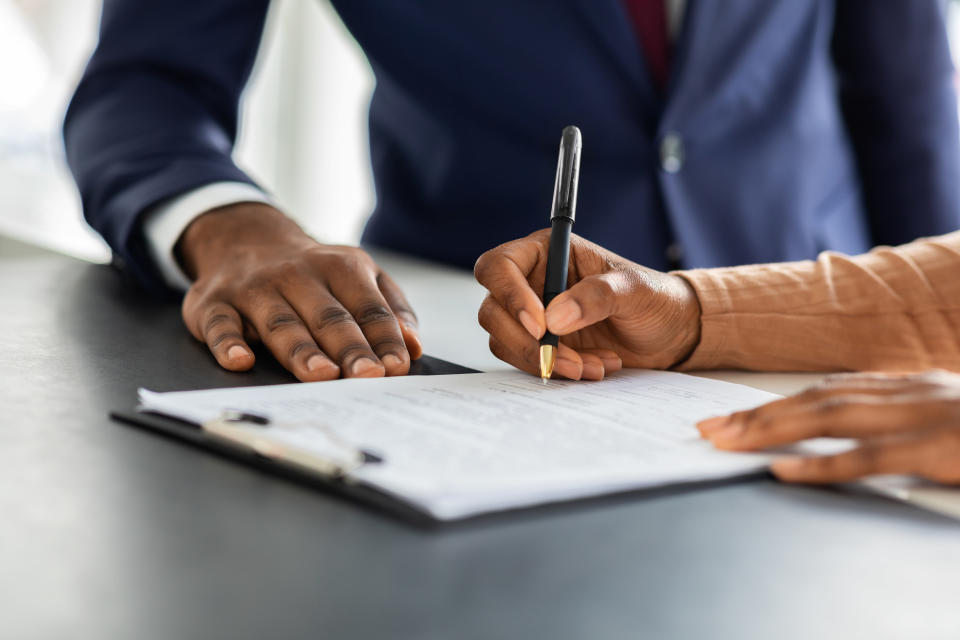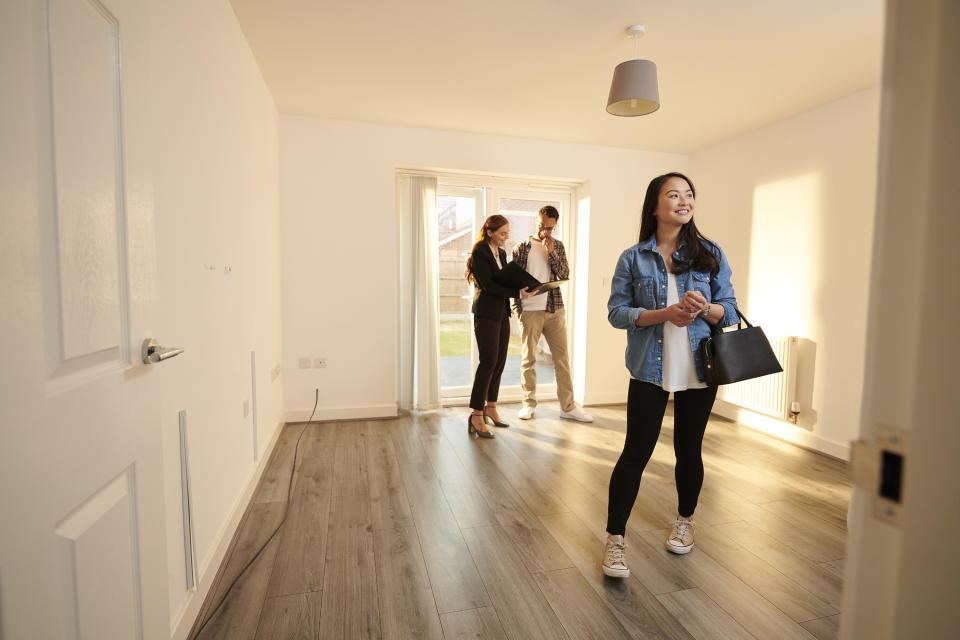13 Ways To Tell If It's A Good Time To Buy A House, According To A Financial Expert
Buying a home is the biggest purchase most of us will ever make. And knowing when the time is right can be tricky, because you have to consider everything from where you are in life to what's going on in the housing market.
IFC / Via Giphy / giphy.com
Hello, stress!
It isn't an easy to decision to make. For anyone. So we leaned on Amy Richardson, a certified financial planner with Schwab Intelligent Portfolios Premium, to share the considerations she takes with her clients.
Comedy Central / Via Giphy / giphy.com
PS: If you're really lost on this whole homebuying thing, it might make sense to connect with a financial planner. Their job is to offer advice and set up a plan that is specific to you and your financial situation.
1.For starters, you should have a stable income.

This is a bit of a no-brainer, but it's worth noting. If your company is in turmoil or you're on the brink of quitting your job, it's likely not the best time to buy a home.
Buying a home basically locks you into a cycle of monthly payments, so it's important that you have money coming in to cover these payments.
2.And a healthy debt-to-income ratio.

If you have no idea what a debt-to-income ratio is, you're in good company. Basically it's a ratio that compares how much money you have coming in (income) against how much money money you have going out (expenses and debt). Basically you don't want your expenses to be so high you can't cover them with your income.
"A good debt-to-income ratio for those looking to buy is the 28/36 rule. If you follow this rule, your total housing costs, which include mortgage principal, interest, taxes, hazard insurance, and potentially homeowner association payments, should not exceed 28% of your gross monthly income and all your debt combined shouldn’t exceed 36% of gross income," said Richardson.
3.Keep in mind that buying a house should never jeopardize your other financial goals.
E! / Via Giphy / giphy.com
Your financial health is a broad concept that encompasses everything from debt to retirement to college savings. If buying a house is going to keep you from contributing to your retirement savings or force you to rack up credit card debt, it's not worth it.
"In order to make sure your housing costs still fit within your overall financial plan and budget, you want to maintain a healthy level of savings in your emergency fund, retirement accounts, and avoid incurring too much debt (like carrying high credit card balances)," said Richardson.
4.And you should have enough money saved to cover the 20% down payment.

If you feel ready to buy and the housing market is in a good spot, it might be tempting to go ahead and purchase a home before you have enough money to cover the down payment. But in the long run, this isn't a great idea.
Richardson said, "As a rule, not having the 20% is likely a good sign you’re not quite ready." She said that "Ideally, I suggest waiting until you can at least put down 20% to avoid your lender requiring that you carry private mortgage insurance (PMI). PMI only protects the lender, not you as the homebuyer. It also requires you to pay monthly PMI premiums on top of your mortgage payments."
So, you'll actually pay more money for your home (because of those additional PMI premiums) if you buy before you have the 20% down payment.
5.If putting in a 20% down payment just isn't going to happen, there are other options, but they may be more expensive in the long run.

It'll take some additional work, but Richardson notes, "There are several federal, state, and local programs available to first-time homebuyers that offer grants or special no- or low-interest loans to cover the cost of a down payment."
She notes, "First-time homebuyers may also qualify for certain loans such as FHA loans and VA loans. FHA loans are guaranteed by the Federal Housing Administration and allow first-time buyers to put down as little as 3.5%, with PMI. If you are an active-duty member of the military, veteran, or a family member, you can qualify for VA loans, which are available for no down payments and no PMI."
That being said, the lower your down payment, the larger your monthly payments, which may cause more stress in the long run.
6.No matter what, paying the down payment shouldn't leave you broke.
NBC / Via Giphy / giphy.com
I know, I know, a down payment is a lot of money. But, before you buy, you should ideally have the 20% down payment and a good chunk of change left over. Why? Because while buying a home may be your biggest financial goal, you don't want to put yourself in a position where you can't pay off your credit card or will go belly up if you lose your job.
"Your financial plan encompasses much more than just this purchase, so how you use your assets has to be diversified," said Richardson. "Before you submit a down payment, make sure to check your savings to ensure you have around three months of liquid assets on hand in case your lender requires a reserve requirement to ensure you are able to make future mortgage payments."
7.To get to a healthy place financially, you might need to have an honest look at your situation and reevaluate your saving and spending habits.

Saving enough money to cover a down payment and keep yourself afloat isn't the easiest thing in the world. To get there, you might need to adjust your saving and spending habits.
This is when a financial planner can be super helpful — they'll ask the tough questions that will help you find areas where you could adjust your approach to saving and spending.
"Also, it takes recognizing what tradeoffs you might need to make in order to make your home purchase possible," explained Richardson. "Talking to an advisor can help you determine whether you can buy the home without it negatively impacting forward momentum in other areas of your financial life."
8.Or, you can try out Richardson's trick for saving that 20% down payment.

"A great tip for someone who is looking to buy a house but doesn’t have the 20% down payment is to review their current housing costs. If these costs are lower than a potential house payment, I suggest putting the difference into your savings each month. This will not only help you build your down payment but also get used to budgeting for a future mortgage," she said.
In short, you start living your life like you're already paying a monthly mortgage in order to a) save money and b) see what your reality will look like once you buy the house.
9.Waiting to buy until you have a high credit score will also save you money in the long run.
UFC / Via Giphy / giphy.com
"In general, an ideal credit score is at least 620 to secure a conventional mortgage," explains Richardson, who notes that if you have a really good credit score, "You could also potentially benefit from your good credit in the form of lower mortgage rates."
So, the better your credit score, the lower your mortgage rate and the less you'll pay for your home in the long run.
If your credit score is far from that 620 baseline, Richardson said, "There are several ways to improve it, such as paying your bills on time and limiting how much debt you put on your credit cards."
10.In general, buying a home only makes sense if you plan to keep it for five to seven years.

There are plenty of people who buy homes as an investment, but Richardson warns that you'll need to "consider the additional housing and maintenance costs involved."
She usually only recommends buying a home if you plan on owning it for several years. "Even if you live in an area where prices typically have appreciated, it may not continue forever, and therefore, it may end up costing you more if you don’t plan on owning the home for at least five to seven years."
11.You also need to consider what the real estate market is like in your area.

If there aren't many homes for sale in your area, chances are the competition among buyers is tough. And when competition among buyers is up, prices tend to jump.
When you're looking to buy a house, these are the sort of things you need to keep in mind. A housing market where everyone is looking to buy and not many people are looking to sell will make buying a home more difficult and more expensive.
12.And how mortgage interest rates are trending.
NBC / Via Giphy / giphy.com
When you don't have the $345,000 needed to buy a home, you have to borrow money. And when you borrow money, you have to pay it back with interest. The higher the interest, the more you'll end up paying when all is said and done. So, you want to consider the way mortgage interest rates are trending when you're getting ready to buy.
A mortgage interest rate is basically the percentage of your total loan balance you have to pay along with your principal payment until your loan is paid off.
Right now, mortgage interest rates are on the rise. In January 2021, the average mortgage interest rate dipped as low as 2.93%. In early June 2022, it was 5.36%.
Still though, even a 5.36% interest rate is low when you zoom out. Richardson confirms, "While interest rates have risen, they’re still relatively low compared to historical trends."
13.If it isn't the right time for you to buy a home — that's OK. Use this time to get your finances in order, and remember that there are pros to renting too.
NBC / Via Giphy / giphy.com
Let's be honest — there are A LOT of things you should ideally have in order before you buy:
- a stable job
- a healthy debt-to-income ratio (28/36)
- a 20% down payment
- additional savings beyond the down payment
- the ability to still meet your other financial goals (retirement, college fund, emergency fund, etc.)
- a good credit score (620+)
- a plan to be in one place for the next five to seven years
So if you have some work to do before you buy, that's totally normal (and to be honest, expected). Plus, don't forget to keep the state of the real estate market and mortgage interest rates in mind!
Richardson confirms, "Both buying and renting have pros and cons — doing what is best for your financial situation is always the most important decision."
Hey homeowners! How did you determine it was the right time to buy? Share your experience below.
6 Reasons Why I, A Millennial, Am Perfectly Happy With Renting And Do Not Wish To Buy A Houseathenavalentine · June 9, 2022
I Bought My First Home Earlier This Year — Here's Everything I Really Wish I'd Known BeforehandRoss Yoder · Oct. 28, 2021
Millennials Are Sharing How They Bought Their Homes, And Surprise, It Wasn't By Skipping Avocado ToastMegan Liscomb · March 4, 2022




